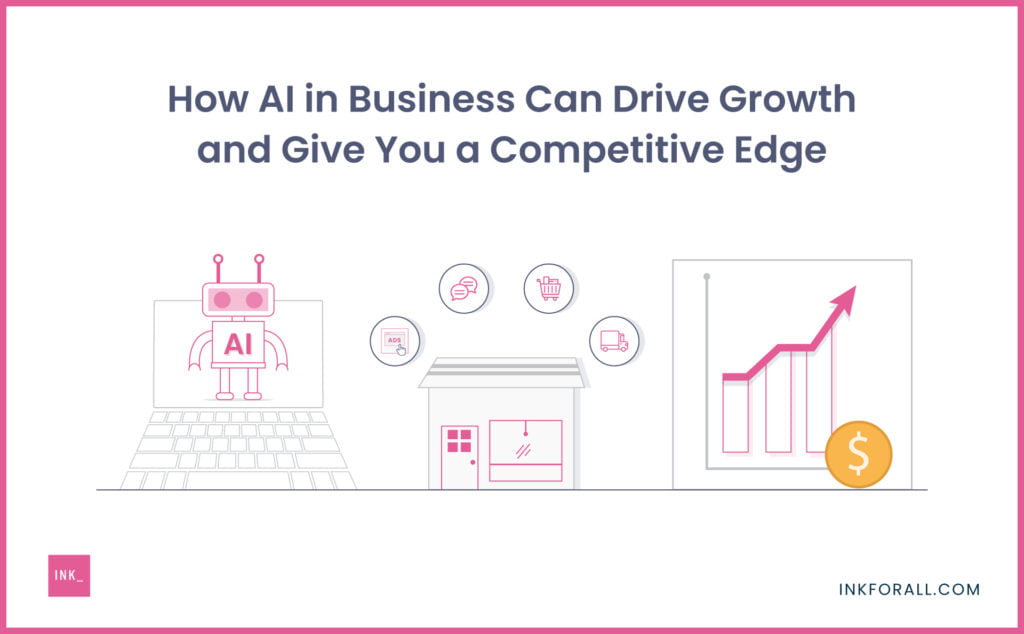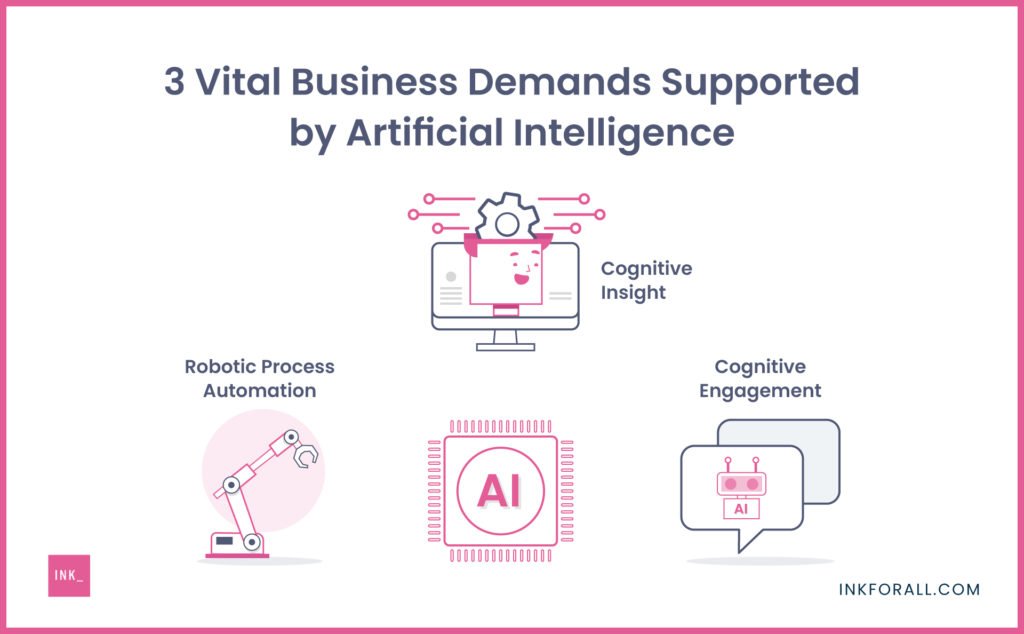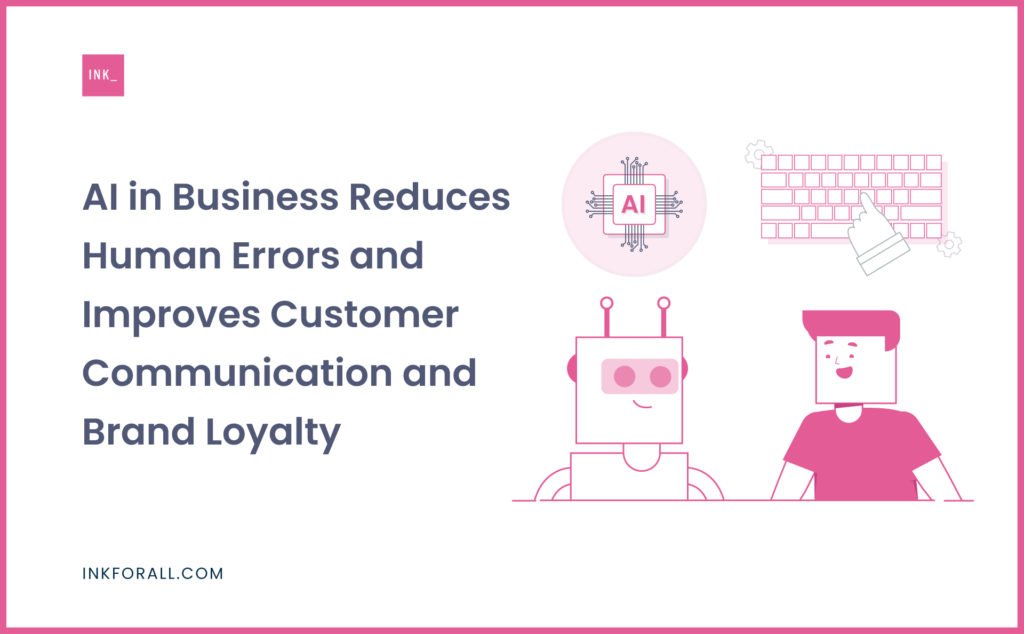

Using AI in business may seem like a futuristic idea reserved for sci-fi movies — well, not anymore. Companies are already using artificial intelligence to forecast sales, predict customers’ needs with auto dialer and boost sales.
Main AI in Business Takeaways:
- Artificial intelligence describes the simulation of human intelligence in machines.
- The most common role of AI in business may be process automation.
- AI applications can include decision-making, speech recognition, visual perception, translation, and chatbot tasks.
- NLP is an AI branch that explores the interaction between computers and human language.
- Businesses that deploy AI in their operations enjoy a drop in expense and a rise in revenue.
- Data scarcity and algorithm bias are some challenges of using AI in business.
AI Breakthroughs in Computing
The early 2010s ushered in several breakthroughs in modern computing. Besides creating more powerful GPUs, we also had access to massive data collection and smarter algorithms.
As a result, artificial intelligence quickly became a thing in business — especially among the tech giants.
For example, Facebook showed off an algorithm that detects cats in pictures at near-human accuracy. Shortly after, Google started using similar technology to understand and rank content better.
As someone fascinated with understanding the how and why humans and AI make decisions, I was intrigued.


Eviction Notice: Writer’s Block
Get unstuck with INK. Craft high-quality content effortlessly. Never be stopped by writer’s block again.
So, I spent hours assessing how Google used neuralnetworks on its search engine. And that led to a theory that the tech giant’s Rank Brain AI would pose a challenge for content creators.
“Prove it,” said my now-partners. And that’s what we did.
The result was an AI-powered tool that helped writers to create content that ranks. What’s more, Fortune 100 companies now rely on our artificial intelligence solution to improve their site’s organic visibility.
In this article, I’ll explore what AI means in business and its advantages. We’ll also examine how brands can use artificial intelligence to drive growth.
First, let’s consider a crucial question:
What is Artificial Intelligence in Business?
The broad term “artificial intelligence” describes the simulation of human intelligence in machines. It involves developing systems to perform tasks that ideally require human intellect.
With that in mind, AI applications can include decision-making, speechrecognition, visualperception, translation, and chatbot tasks.
I should also point out that artificial intelligence is no longer a futuristic notion from Hollywood. While we’re still a long way from self-aware cyborgs like Ultron, several AI applications already exist in our daily lives.
Here are some platforms using AI in their products:
- Twitter: Fight hate speech and misinformation
- Google Maps: Analyze traffic and suggest a faster route
- INK: Improve content relevance for search engines
- Uber: Determine the price of your ride or the wait time
- Snapchat: Identify user’s face and apply filters
- Netflix: For media recommendations
- SafetyCulture: For template generation, training course creation
As you can see, the link between business and artificial intelligence has grown stronger in recent years.
According to a study on AI use in enterprises, the number of companies implementing AI-related technologies rose by 270% between 2015 and 2019. What’s more, the number surged by 37% in 2019 alone.
So, how do these companies use artificial intelligence?
How is AI Used in Business?


According to Harvard Business Review, artificial intelligence supports three vital business demands. These needs range from customer and employee engagement to gaining insight through data analysis. But, the most common role of AI in business may be process automation.
It sounds a little complicated, I know. So, Let me explain what it all means.
Robotic Process Automation
Robotic Process Automation (RPA) involves using productivity tools to automate repetitive tasks in the workplace.
Although the term suggests that hardware robots execute repetitive tasks, that’s not the case. Instead, a software tool autonomously executes a task based on specific rules or structure.
Examples of such tasks include:
- Reading contractual documents to extract provisions
- Transferring email and call center data into system records
- Claims administration in healthcare and insurance
- Credit card application process
- Online scheduling of appointments
Many businesses even rely on specialized virtual assistants, such as those from Virtual Latinos, to support medical admin tasks alongside AI tools.
As in most AI-applications, RPA prevents human errors and reduces costs at the same time.
For example, a commercial bank was looking to automate 13 processes that handled 1.5 million annual requests. So, it deployed 85 software bots to handle repetitive tasks.
As a result, the bank managed to add capacity that would be the equivalent to 230 full-time employees at the cost of recruiting 30% more staff. What’s more, it reported a 27% increase in tasks performed “right the first time.”
Industries that use robotic process automation include healthcare, manufacturing, retail, and financial firms, among others.
Cognitive Insight
Cognitive insight is another popular use of artificial intelligence in business today. It involves using a machine-learning algorithm to process and interpret a massive amount of data.
Thanks to cognitive insight, businesses can now do any of the following:
- Identify credit card fraud in real-time
- Automate personalized targeting of digital ads
- Predict what a specific customer is likely to buy
- Detect insurance claim fraud
As you may have guessed, this AI application frees up humans to focus on less repetitive tasks.
For example, Deloitte’s audit practice currently uses a cognitive insight algorithm to extract terms from contracts. As a result, an audit can cover more documents without needing human auditors.
Cognitive Engagement
Personalization is a vital aspect of any business practice. Unlike before, brands now have to craft engagement strategies to meet their customers’ specific tastes.
But that’s easier said than done. Indeed, many companies struggle to create personalized experiences despite having access to the necessary data.
That’s where cognitive engagement comes in.
Cognitive engagement describes any project that engages both employees and customers. It uses machine learning, natural language processing chatbots, and intelligent agents to create personalized experiences.
Some examples of tasks that rely on cognitive engagement include:
- Product and service recommendation system for retailers
- Intelligent agents that offer customer service
- HR site for addressing employees’ queries
- Health treatment recommendation system
Back in 2016, Starbucks rolled out its cloud-based Digital Flywheel technology for a personalized customer experience.
This cognitive engagement tool informs Starbucks of every nuance of your coffee drinking habit. Whether you prefer an espresso on a sunny day or a latte on a rainy day, this coffee chain will know it all.
That way, it can offer a drink that you haven’t thought about as it has insights into what you’re most likely to buy.
The bottom line is that various businesses rely on artificial intelligence applications in unique ways. And that brings us to the next aspect of AI in business.
5 Applications of AI in Business That Can Drive Growth


Some applications of artificial intelligence in business that can drive growth are product recommendations, targeted marketing, and business intelligence. Others include customer service and natural language processing.
Let’s delve a little deeper into the power and potential of AI.
1. Natural Language Processing
If you’re wondering whether machines can read, write, or understand human language, the answer is a resounding yes!
Natural Language Processing — or NLP for short — is an AI branch that explores the interaction between computers and human language. This is how Siri understands your request and responds accordingly.
However, NLP’s application extends beyond voice recognition in digital assistants to several other AI-based tools. These include Amazon Comprehend, IBM Watson, and our very own INK.
Companies use NLP solutions to generate automated business reports without human intervention. It can also perform sentiment analysis of social media comments to assess people’s perception of your brand.
At this point, you already have a rough idea of the benefits of artificial intelligence in business. But let’s highlight them anyway.
2. Customer Service
Chatbots are a vital application of AI in business. From troubleshooting to customer interaction, AI-powered bots now deliver tremendous value in customer support operations.
Indeed, the average satisfaction rate of bot-only chat is 87.58%. That’s almost two percentage points higher than human agents.
Intrigued? The rationale for why is simple.
Chatbots work round the clock to answer simple queries and proactively start conversations with customers. As a result, companies can save more money and time on customer support or call centers.
According to a study on the potential for chatbots to save companies money, they found that chatbots will deliver a whopping $8 billion in cost savings by 2022. What’s more, they will save businesses 2.5 billion hours by 2023.
3. AI in Business Intelligence
More than ever, companies now have access to a massive amount of customer data. Unfortunately, converting valuable information into actionable insights is not nearly as simple as you might imagine.
That’s because many business owners tend to rely on their gut instinct when making decisions. As a result, it becomes easy to dismiss data that is not consistent with specific beliefs.
That’s where business intelligence (BI) comes in.
BI involves using business analytics, data mining, data visualization, and other AI tools to make data-driven decisions. In other words, you’re using artificial intelligence to obtain valuable insights from data.
To effectively manage and analyze the vast amounts of content generated, many companies are turning to GEO services to gain deeper insights and improve their strategies.
By leveraging these services, businesses can better understand how their content performs across different regions and demographics.
It’s no wonder that many companies consider business intelligence a priority.
In 2020, 54% of enterprises said Cloud Bi is critical or vital to their ongoing or future initiatives. What’s more, an organization that implements a Cloud Bi solution can experience up to 127% ROI in three years.
Excellent examples of business analytics platforms are Microsoft Power Bi and Oracle Analytics Cloud.
4. Customer Insights
AI and data provide businesses with an in-depth view of their customers’ overall journey or trends. As a result, it becomes possible to sell a product or service based on individual behavior.
This real-world example will help illustrate this point.
Unilever has 26 data centers across the globe where data scientists work to generate insights from various sources. One such insight helped the company discover a link between ice cream and breakfast.
Besides the social mentions, lyrics of at least 50 songs in the public domain talk about ice cream for breakfast. Besides, brands such as Dunkin’ Donuts were already selling ice cream in the morning.
So, Unilever used the insight to develop a range of cereal-flavored ice cream under its Ben & Jerry brand. These include Frozen Flakes and Fruit Loops.
Customer insights can help enhance your brand’s overall marketing strategy. That way, you can provide a tailored experience that focuses on each customer’s needs.
5. Product Recommendation
Product recommendation is another essential way to use AI in business.
If you’ve watched a movie on Netflix recently, then you’re familiar with recommendation engines. It’s the Other Movies You May Enjoy option that foresees your possible choice from the massive movie library.
Besides Netflix, you’ll also find recommendation engines on Facebook and retail sites such as Amazon. In fact, roughly 35% of Amazon’s transactions come from its recommendation algorithm.
So, how does it work?
Recommendation engines rely on algorithms and data to recommend the most relevant product to users. Think of it as an automated shop assistant that anticipates your needs.
These engine systems are now more advanced than ever.
Thanks to machine learning algorithms, the predicting process is now more accurate than ever. Furthermore, the algorithms change based on the data from the recommendation system.
What are the Advantages of AI in Business?
Businesses that deploy artificial intelligence in their operations enjoy a drop in expense and a rise in revenue. Indeed, 22% of companies using AI said the technology accounted for over 5% of 2019 revenue. Furthermore, revenue generated by AI increased year-over-year.
Besides the revenue boost, here are other advantages of using AI in business:
- Streamlined hiring process
- Reduction in human errors
- Improved customer communication
- Stronger brand loyalty with personalization
- Objective forecasting
Despite these advantages, using artificial intelligence in business also comes with some challenges.
There are the potential issues with data security and privacy. This is especially crucial since several artificial intelligence applications involve collecting user data.
Then there’s the problem of data scarcity and algorithm bias. But, the biggest challenge may be the limitations in current computing capability.
That brings us to the final question:


Eviction Notice: Writer’s Block
Get unstuck with INK. Craft high-quality content effortlessly. Never be stopped by writer’s block again.
Is AI the Future of Business?
There’s no doubt that artificial intelligence is the future of business. In a survey investigating the use of AI in business applications, 95% of brands said AI technology is “important to their digital transformation efforts.” Meanwhile, another 65% of companies indicated artificial intelligence is “very important” to their business goals.
AI deployment within companies is somewhat limited at the moment. And that’s primarily due to fear.
Due to the narrative that robots are coming for our jobs, some business owners are reluctant to take up AI. However, a recent report on AI suggests that the worry may be unwarranted.
According to their results, 87% of organizations plan to increase or maintain employee numbers after adopting automation. So, this narrative is already losing traction and doesn’t hold up when compared to the reality of AI in use.
So, what does the future hold for AI and business? I’ll summarize the answer with two words — limitless potential.
